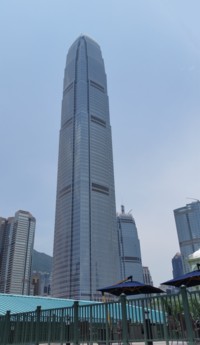Hong Kong
Hong Kong is one of those places that most Australians seem to be familiar with. Not only is it a convenient stop on the way to somewhere else but many Chinese Australians, going back as far as the gold-rushes, have their ancestral roots here or close by. Cantonese, spoken in Hong Kong was the dominant language of origin. In spite of a new wave of Mandarin speaking people arriving in Australia from further North, in the Mosman Fish and Chip shop we still say: 'mm gai' or 'do jai' - not the Mandarin: 'sez sez'. Actually, everyone speaks Australian English so we more often we just say 'thanks', when carrying off our (polyunsaturated) oily treat with its over-generous helping of chips.
On paper, the general standard of living is much higher in Hong Kong than in China. Household final consumption expenditure per capita in Hong Kong is third highest in the World, on a par with the United States. Mainland China comes after 110 other countries in that race, with only one ninth of the nominal Hong Kong buying power per household.
Until recently, well, during my recent memory, Hong Kong, comprising Hong Kong Island, Kowloon and the New Territories, was a British territory. But China was unhappy about the treaty arrangements. Under the Thatcher prime ministership there was a stand-off with China threatening to invade. Then, with discretion being the better part of valour, Britain began preparations for a planned withdraw. Thus in 1997 under the Blair prime ministership, Hong Kong became a Special Administrative Region of the People's Republic of China.
As more recent visitors have noticed, even under new management, Hong Kong continued to develop rapidly. Perhaps not as much physically as Singapore, the other once British territory in the region, but sufficiently to have long surpassed their Imperial progenitor in nominal wealth per capita, based on international purchasing power.
Hong Kong Financial District
As indicated above, household purchasing power in Hong Kong is on a par with the United States. Mind you, a visit to the actual city or country confirms what many are more inclined to believe. Purchasing power isn't everything. For example to me, a middle class life in an English village is a vastly more attractive proposition than life in a high rise tower in Hong Kong.
We all base our choice of home on many more factors than material purchasing power. This has been somewhat bizarrely demonstrated recently in Australia where we are discovering that an extraordinary number of our parliamentarians are dual citizens. A parliamentary discussion paper estimates that up to a quarter of all Australians are entitled to dual citizenship. Based on my acquaintances I'm surprised that it's that low. This cultural ambiguity no doubt contributes to a very high propensity to international travel. We dual citizens could choose to live somewhere else but have chosen our homeland with our feet, irrespective of Australia's ranking in international tables.
I first visited Hong Kong way back in the British days when I went with some Australians to a very nice British sports club frequented by expatriates convinced of our collective superiority. Those days are gone but much remains the same: the Peninsular Hotel still has a fleet of Rolls Royce limos; the tram still runs up Victoria Peak; the ferries still run; as do the double-decker trams in town. But now there are many more modernist skyscrapers in the financial district and a forest of very high apartment blocks along the harbour side.
Old and New
A metro has been added and continues to grow after each visit. It's a commercial and financial powerhouse full of billionaires. As they say in real estate there are three rules: location; location; location. It's the gateway to China.
A couple of years ago, again with Craig and Sonia, we did most of the things on the tourist agenda: the peak; the ferries; Macau; the markets. Nevertheless the siren call of the latter still called to Wendy, so I decided on the museums. These are very good and reminded us of how Hong Kong came to be here at all. Like Singapore; India; and some argue Australia, it was all part of British commercial enterprise based on trade and the corresponding Empire building necessary to protect that commerce.
The British arrive
The Naval Museum details with some pride early Chinese seafaring achievements and the Museum of History records both prehistoric and more recent culture. There are many selected pictures in the album from our trip (linked below).

